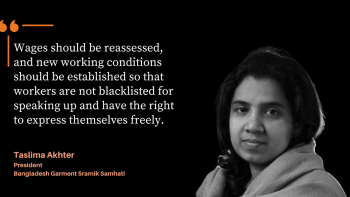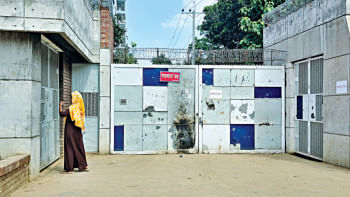We need an independent commission to resolve labour disputes

Labour disputes and grievances are an inherent part of any industrial relations system. However, effective policies and functional labour administration institutions play a crucial role in maintaining the harmonious relations between employers and workers by establishing legislative and structural mechanisms to prevent and mitigate such conflicts before escalation.
Bangladesh has a workforce heavily reliant on labour-intensive industries. Since the 1980s, industrialisation has resulted in an upsurge in the workforce in Bangladesh. This fast-paced growth of industrialisation in Bangladesh has not been accompanied by similar developments in labour market institutions, resulting in significant challenges in working conditions and labour rights, which need to be addressed urgently.
The practice of social dialogue across the enterprise, sectoral, and national level, combined with policies and structural barriers in the practice of industrial relations, has hindered the growth of economic activities. All of this has necessitated strong institutions that can manage labour conflicts and provide various avenues of resolution crucial for Bangladesh to maintain economic stability and enhance workers' rights. As a country graduating from the Least Developed Country (LDC), it is now imminent for Bangladesh to consider an independent alternative dispute resolution (ADR) commission for labour dispute resolution. With institutional reform being one of the primary mandates of the interim government, this is even more crucial as it will help foster better labour relations and alleviate the burden on the traditional labour judicial system, ie the labour courts, who are currently over-burdened with over 21,000 labour disputes. Needless to say, considering the large number of workforces in the country, the density of labour cases in the labour court, also raises question on the limited access to justice.
Why is an independent ADR Commission necessary?
A study conducted by BLAST in 2019 shows that the average time taken to dispose a labour case was 630 days for awarded cases and 571 days for dismissed cases. The combined average time taken for both awarded and dismissed cases stands at 601 days, which is more than 11 times the statutorily prescribed limit of 55 days. Coupled with the all-encompassing jurisdiction of the labour courts, this means that courts are not well equipped to dispose of cases in time. The long delay of these proceedings bears unequal significance to the concerned parties, as workers are likely to be more effected due to delay in attaining justice as well as for the costs associated with continuing litigation. According to a 2018 report titled, "Baseline Study on Status of Legal Services to Workers by the Labour Courts," by Bangladesh Institute for Labour Studies (BILS), the number of cases has risen sharply in recent years, from 5,923 in 2006 to 13,739 in 2010; and in April 2018, a total of 17,394 cases were pending, of which 10,001 cases were pending in the three labour courts in Dhaka alone. As of now, over 21,000 cases are pending in the labour courts.
Despite efforts by the Ministry of Labour and Employment to increase the number of courts, the number has not seen a decline in recent years. An independent ADR commission for handling labour disputes will allow for disputes to be resolved in a timely manner, as ADR methods such as mediation and arbitration are designed to be quicker, less adversarial and more flexible. Due to the quick disposal of cases, it is beneficial for both employers and workers, as it also allows for minimised disruption to production and their livelihoods.
The government in the recent past has suggested for the ADR to be conducted by the existing labour administration institutions, mainly the Department of Labour (DOL) and Department of Inspection for Factories and Establishments (DIFE). However, impartiality of the ADR processes, particularly in the political reality of the country remains a question. Recent cases that have attracted global attention have shown us that tendency of undue influence, political pressure, and sometimes corporate pressure being applied to impact the outcomes of legal disputes.
An independent ADR commission stands as the best possible solution to ensure agreements are reached and decisions are made solely on the merits of the case, as well as an increased trust of the people in these labour administration institutions. For Bangladesh, as a ratifying country of the ILO Labour Inspection Convention, 1947 (No. 81), labour inspectors shall not be involved in resolving conflicts as it can be a potential impediment to the effective discharge of their primary duties as labour inspectors can bring into question their impartiality.
An ADR commission specifically focused on labour disputes would be technically more suited to address the unique challenges faced by workers and employers in the world of labour. As of now, in Bangladesh, the law has not provided any criteria of judicial knowledge, experience in labour law matters, or minimum qualification for members in the labour court, except for the chairman (same for civil judges). This is also true for labour inspectors and government officials acting as conciliators. In the absence of any provision requiring prior experience (in dealing with labour law matters) or minimum training, it is often difficult for judges and conciliators to resolve disputes requiring technical understanding. This problem can be largely addressed by ensuring an independent ADR commission consisting of labour experts, who will be better equipped to handle complex situations and disputes more effectively and efficiently.
All of these challenges become even more pronounced in the absence of a sufficient workforce in DIFE and DOL. Currently, conciliation in both these institutions are carried out by labour inspectors and officials in charge of multiple responsibilities. The system, as it stands now, is fragmented and overseen by different government agencies, sometimes with unclear or overlapping mandates. As seen, industrial accidents and incidences of fire often bring to attention the lack of sufficient number of labour inspectors. Therefore, entrusting them with more responsibilities, is not only impeding the conciliation, but also possess a practical challenge for them to perform their duties as a labour inspector.
While gradual shifting of these responsibilities from one department to another is a temporary solution to address the challenges pertaining to dispute resolution, the formation of an independent ADR commission is likely to reduce the burden on the entire system and allow for quality delivery of work from all these institutions.
International precedents for ADR in labour disputes
Several countries around the world have adopted and, through trial and error, successfully established ADR mechanisms that address labour disputes. These institutions can provide a blueprint for Bangladesh to adopt to its national context and economic reality. The Fair Work Commission in Australia, the Commission for Conciliation, Mediation, and Arbitration (CCMA) in South Africa, the National Conciliation and Mediation Board in Philippines, are all examples of dedicated bodies that resolve labour disputes without the need for costly and time-consuming litigation procedure. Statistically, since its inception in 1996, the CCMA in South Africa, deals with around 180,000 to 200,000 new cases annually. Of these, about 70 percent of disputes are settled at the conciliation stage, either through mutual agreement or withdrawal of cases. In cases where disputes proceed to arbitration, around 60 percent to 70 percent of cases result in a binding decision. These numbers reflect the role that can be played by an independent ADR commission in maintaining harmonious industrial relations.
By learning from the challenges and global best practices, it is high time that Bangladesh took a bold step towards the establishment of an independent ADR commission, that can uphold justice and contribute to the overall stability of the economy.
Chowdhury Albab Kadir, barrister-at-law, is an advocate currently working at International Labour Organisation in Bangladesh.
The views expressed in the article are his own and is not reflective of the organisation.
Follow The Daily Star Opinion on Facebook for the latest opinions, commentaries and analyses by experts and professionals. To contribute your article or letter to The Daily Star Opinion, see our guidelines for submission.

 For all latest news, follow The Daily Star's Google News channel.
For all latest news, follow The Daily Star's Google News channel. 










Comments